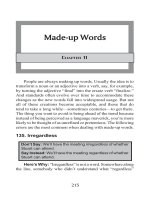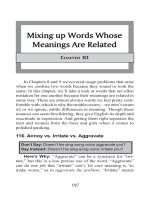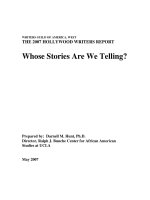Mixing up Words Whose Meanings Are Related
Bạn đang xem bản rút gọn của tài liệu. Xem và tải ngay bản đầy đủ của tài liệu tại đây (391.55 KB, 18 trang )
197
Mixing up Words Whose Meanings Are Related
C
HAPTER
10
Mixing up Words Whose
Meanings Are Related
197
In Chapters 8 and 9 we covered usage problems that arise
when we confuse two words because they sound or look the
same. In this chapter, we’ll take a look at words that are often
mistaken for one another because their meanings are related in
some way. These are almost always words we feel pretty com-
fortable with, which is why the trouble occurs—we aren’t aware
of, or we ignore, subtle differences in meaning. Though these
nuances can seem bewildering, they give English its depth and
exactitude in expression. And getting them right separates the
men and women from the boys and girls when it comes to
polished speaking.
116. Annoy vs. Irritate vs. Aggravate
Don’t Say: Doesn’t his sing-song voice aggravate you?
Say Instead: Doesn’t his sing-song voice irritate you?
Here’s Why:
“Aggravate” can be a synonym for “irri-
tate,” but this is a less precise use of the word. “Aggravate”
can do one job that “irritate” can’t: Its core meaning is “to
make worse,” as in aggravate the problem. “Irritate” means
s Bad Grammar Ch 10.pmd 3/17/2004, 9:46 AM197
198
When Bad Grammar Happens to Good People
to rouse to impatience or anger. It also means to cause inflam-
mation of the skin, as in the new lotion irritated the rash.
“Annoy” is somewhat milder. It means to cause slight irritation
by troublesome behavior, and often carries with it the sense of
repeated actions or attacks. Depending on the degree of frustra-
tion the speaker wishes to convey in the example sentence, she
may choose either “annoy” or “irritate.” But “irritate” is pre-
ferred to “aggravate” because we’re not talking specifically about
making something worse. More correct examples of each:
His habits annoy me, but I can live with them.
Her habits
irritate me so much that I don’t think I can
live with them any more.
Joe’s frequent tardiness
aggravated his situation with
his boss.
The mosquitoes
annoyed Sheldon, so he spent much
of the barbecue indoors.
Donna was
irritated by the doctor’s casual attitude.
Stop walking away; you’re just
aggravating the
problem.
117. Burglary vs. Robbery
Don’t Say: Officer, they must have committed the robbery
when we were on vacation.
Say Instead: Officer, they must have committed the
burglary when we were on vacation.
Here’s Why:
Burglars don’t like to get up close and per-
sonal with their victims. “Burglary” refers solely to the act of
entering a place with the idea of taking something that doesn’t
belong to you, and then, if you aren’t caught, taking it. “Rob-
bery,” on the other hand, is taking something from someone by
force. There’s no sneaking around involved—unless maybe
you’re an unlucky burglar who gets caught in the act and resorts
to force to get the job done. In the example sentence, where the
s Bad Grammar Ch 10.pmd 3/17/2004, 9:46 AM198
199
Mixing up Words Whose Meanings Are Related
bad guys did their dirty deed while the family was gone, it’s clearly
a case of burglary. Additional correct examples are:
After she was robbed at gunpoint, Mary hated going
out alone at night.
I can’t imagine how we were
burglarized the day after
Scam Security Systems came and installed our alarm.
The threat of highway
robbery made a lot of carriage
travelers nervous.
He took up
burglary just so he could wear a black cat
suit and climb up the side of buildings at night.
118. Can vs. May
Don’t Say: Can I use your lucky bowling ball?
Say Instead: May I use your lucky bowling ball?
Here’s Why:
“Can” describes the ability to do something.
“May” refers to the possibility that something may occur, and
to the requesting or granting of permission. In this case, the
speaker is clearly making a request, not asking if he is physi-
cally capable of using the ball. Other correct examples are:
You may go to the game if you promise not eat too
many hot dogs like last time.
Can Mike finish building that popcorn statue before
the wind kicks up?
Gee, you look lonely;
may we join you?
Can you believe the report said it may snow tomorrow?
119. Compose vs. Comprise
Don’t Say: The club’s athletic committee is comprised of
10 sedentary men.
Say Instead: The club’s athletic committee is composed
of 10 sedentary men.
s Bad Grammar Ch 10.pmd 3/17/2004, 9:46 AM199
200
When Bad Grammar Happens to Good People
Here’s Why:
Both “compose” and “comprise” are about
the relationship between parts and the whole. But the two words
come at that relationship from different sides. “Compose”
means to make up. It refers to the act of creating a whole by
assembling a bunch of parts (think of composing a symphony
note by note). “Comprise” means to take in or to contain. Its
frame of reference is the whole and what parts may be con-
tained inside. The traditional rule of thumb for usage is: The
whole comprises the parts; the parts are comprised in the
whole; the parts compose the whole; the whole is composed
of the parts. In the example sentence, the meaning is that the
10 sedentary men, in this case, the parts, make up the whole,
which in this case is the committee. Therefore, “composed of”
is the correct choice. “Comprised of” is never correct. Here
are more examples:
The new congressional district comprises more ethnic
groups than before.
Eight players cannot
compose a baseball team.
The jury
comprised six men and six women.
His argument was
composed of weak points.
His argument
comprised weak points.
120. Convince vs. Persuade
Don’t Say: How did you convince them to fly across the
country for dinner?
Say Instead: How did you persuade them to fly across
the country for dinner?
Here’s Why:
“Convince” means to succeed in getting
someone to believe a statement or a proposition. “Persuade”
also means bringing someone around to a particular way of think-
ing, but it carries the sense of persuading to action. If you can
convince someone it’s about to storm, chances are you can per-
suade him to stay inside. Additional correct examples are:
s Bad Grammar Ch 10.pmd 3/17/2004, 9:46 AM200
201
Mixing up Words Whose Meanings Are Related
Please stop talking; your arguments convinced me
an hour ago.
Steve
persuaded his wife to run for the state senate.
How did he
convince you that drinking all that beet
juice was a good idea?
Were your teeth red after he
persuaded you to drink
all that beet juice?
121. Eager vs. Anxious
Don’t Say: Leonard is anxious to meet Sylvia because he
heard she plays a mean trombone.
Say Instead: Leonard is eager to meet Sylvia because he
heard she plays a mean trombone.
Here’s Why:
“Anxious” means to be concerned, worried,
full of anxiety. “Eager” means that you’re looking forward to
something with pleasure. So unless Leonard is going to be
competing against Sylvia for the same trombone spot in a band,
he’s not anxious to meet her, but eager. Additional correct
examples are:
Bradley was anxious about seeing his old girlfriend
because he had gained so much weight.
The citizens were
anxious about the president’s ill
health.
We are
eager to settle this strike.
I’m
eager to get to the honeymoon, because planning
this wedding is wearing me out.
122. Explicit vs. Implicit
Don’t Say: The warning was implicit: Do Not Open Near
Fire!
Say Instead: The warning was explicit: Do Not Open Near
Fire!
s Bad Grammar Ch 10.pmd 3/17/2004, 9:46 AM201
202
When Bad Grammar Happens to Good People
Here’s Why:
The world would be a dangerous place if
warning labels were implicit. “Implicit” comes from “implied”
and refers to something that is not said outright but that is un-
derstood. “Explicit” is something said outright, something made
very clear. In this case, the warning label was obviously a clear,
up-front expression, so “explicit” is the right choice. Additional
correct examples are:
How could you ignore the explicit instructions I gave
you in my memo?
Her eyes told the sad story
implicitly.
If you’re not interested in seeing her again, you should
state your feelings
explicitly.
The message
implicit in his look was “go ahead and
do it, just don’t tell me the details.”
123. Figuratively vs. Literally vs. Virtually
Don’t Say: He was, literally speaking, up to his neck in
paperwork.
Say Instead: He was, figuratively speaking, up to his neck
in paperwork.
Here’s Why:
“Literally” means according to the literal
meaning of the words—actually true. So unless this poor man
is really, truly buried up to the neck in stacks of paper, “liter-
ally” is incorrect. “Figuratively” means according to or based
on a figure of speech—metaphorical. And that’s clearly the
meaning of this sentence. “Virtually” means that for all practi-
cal purposes a thing is true, or that it is almost or nearly so, as in
virtually covered with dirt. Here are correct examples of each:
Once George put those suction cups on, he was
literally climbing the walls.
They called you the “hired gun” on this project, but I
hope that’s not
literally true.
s Bad Grammar Ch 10.pmd 3/17/2004, 9:46 AM202
203
Mixing up Words Whose Meanings Are Related
If you betray me, I’ll tear you limb from limb—but of
course, I mean that figuratively.
I am rich in a
figurative sense because I have a full
and happy life.
Shelly has read
virtually the entire dictionary; for some
reason, she just skipped the words beginning with X.
He waited until the talking had
virtually stopped before
addressing the group.
124. Imply vs. Infer
Don’t Say: When you say, “get out,” are you inferring that
you want me to leave?
Say Instead: When you say, “get out,” are you implying
that you want me to leave?
Here’s Why:
The difference between “imply” and “infer”
is in their points of view. Implying is something that’s being
done by the person (or thing) doing the communicating. His
words or gestures are suggesting something beyond the literal
meaning of his statements. Inferring, on the other hand, is done
by the person on the receiving end of the communication. It’s
the action of reading between the lines to get at a meaning
beyond the literal statement. In the example sentence, “imply-
ing” is correct, because the speaker is referring to the meaning
suggested by the other’s words, “get out.” Here are some more
correct examples—note that they include the noun forms of
these verbs, “implication” and “inference”:
His note implied that he would take action.
(The sentence is about the action of suggesting some-
thing, not about our action of reading between the lines.)
Laura inferred from that note that he would take action.
(Here the point of view is reversed—the sentence is about
Laura’s action of interpreting the note, not the note’s act
of communication.)
s Bad Grammar Ch 10.pmd 3/17/2004, 9:46 AM203









